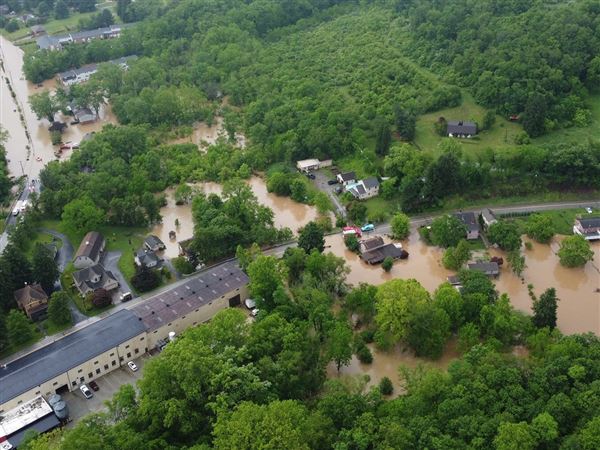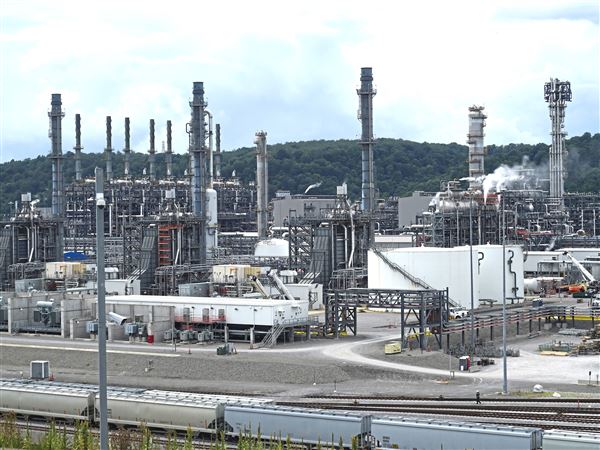The Keystone XL pipeline was a hot national issue in 2014 and could become even hotter this year.
Last fall, Senate Democrats narrowly defeated a bill that would have authorized the construction of the transnational pipeline, the Associated Press reported. The issue was back in the news on Tuesday when the White House said that President Barack Obama would not sign a Keystone XL bill if one came to his desk.
In November, Republicans bolstered their hold on the U.S. House, which had passed the bill, and gained a majority in the U.S. Senate. The bill needed 60 votes to pass the Democratic-controlled Senate last fall, and it got 59.
U.S. Rep. Scott Perry, R-Carroll Township, supported the pipeline and has said it would create more than 40,000 jobs. We’re fact-checking that statement.
Perry’s statements
Nov. 16, 2014 email: “This week, the House took action to create over 40,000 good-paying jobs, reduce our dependence on Middle East oil and lower energy costs for hardworking Americans by again approving the Keystone XL Pipeline with a strong bipartisan majority.”
May 16, 2013 news release: “Today, the House Transportation and Infrastructure Committee adopted legislation for the Keystone Pipeline, which could create an estimated 42,000 new jobs and deliver approximately 83,000 barrels of oil a day, substantially reducing our reliance on energy from unstable sources.”
Perry’s source
“President Obama’s own State Department has said the Keystone Pipeline would create American jobs and substantially reduce our reliance on energy from unstable foreign sources,” Perry wrote in a statement sent by email from Robert Reilly, his deputy chief of staff.
The statement included a link to a list produced by the Republican Party of five things the Keystone XL Pipeline “will do to build our economy,” which makes the creation of 42,100 jobs its first point.
That figure comes from the U.S. Department of State’s January 2014 Final Supplemental Report. Perry’s statements do not include information from that report that the jobs are for only the estimated two-year construction period of the project, and are not operational jobs, according to the state department’s report.
Since its release in January 2014, the State Department report has become the most-often cited source for the projected jobs related to the pipeline.
Estimated jobs
During construction: The report breaks down those 42,100 jobs into 16,100 direct jobs at firms awarded contracts, including construction, in the creation of the pipeline. The other estimated jobs would come from “indirect and induced spending,” such as jobs servicing workers during the construction process.
Four states -––Montana, South Dakota, Nebraska and Kansas -––would get 29 percent, or 12,000, of the total estimated jobs.
Operations: After those two years of production, the estimated job numbers plummet to a total of 50; of those, 35 are considered permanent. The remaining 15 jobs would be “temporary contractors.”
Perry’s response
When asked about the temporary nature of the 42,100 jobs in Perry’s statement, Reilly said that Perry “understood that many of these jobs would last until the construction phase was completed.”
“Congressman Perry (and the York Daily Record) has advocated for transportation infrastructure in the past, even though those jobs last for finite periods of time as well,” the statement continued. “That doesn’t change the fact that these are good-paying jobs that would benefit tens of thousands of families and many local communities.”
The 42,000 jobs figure might turn out to be correct. Only time will tell (assuming the pipeline is approved). But it’s safe to say that number is overhyped by pipeline supporters.
Just 38 percent of those projected jobs are direct construction positions -––lasting a couple of years. Most of the rest are indirect jobs, many of which would have fairly tenuous links to the pipeline construction. The pipeline would create very few long-term jobs.
Still, 16,000 jobs -––even for just two years -––would boost the economy.
Of course, this analysis doesn’t address the environmental or climate change impact of the project.
––––
––Scott Fisher, opinion page editor
––––
Tell us what you’d like to see us fact-check -––whether it has to do with state or local government, schools, public safety or other topics.
Make sure your idea is fact-checkable: For example, a statement by an official that a certain project would create a specific number of jobs is fact-checkable; don’t ask us to fact-check why the political party you don’t like is always wrong.
Email your ideas to news@ydr.com with the subject line “Fact-check idea,” or tweet @ydrcom, or post your idea on our Facebook page.
For more fact-checks, visit ydr.com/pafactfinder.
––––
TransCanada, the Canadian company based in Calgary, Alberta, that is behind the pipeline, gives these specifics of the proposed project:
––1,179 miles of 36-inch-diameter pipeline
––329 miles of the pipeline would cross through Canada
––840 miles would take Canadian crude oil through the central United States to meet the Gulf Coast Pipeline Project in Steele City, Neb. That additional pipeline, which would transport the crude to refineries on the U.S. Gulf Coast, would be approximately 485 miles long
––The pipeline would transport up to 830,000 barrels of oil per day
York Daily Record readers have been weighing in on the issue and its prospects of passage. Here is a recent letter in support and one opposed. Also, TransCanada spokesman Matthew John wrote a letter to the editor responding to the opposed letter that also touches on the construction jobs that are the focus of this fact-check.
U.S. Rep. Scott Perry, R-Carroll Township, issued the following statement in response to this fact-check through an email sent by Robert Reilly, his deputy chief of staff:
“The new Republican Congress has forced President Obama to finally admit to the American people that he doesn’t support this common-sense plan to expand American infrastructure and create more domestic energy. President Obama’s own State Department has said the Keystone Pipeline would create American jobs and substantially reduce our reliance on energy from unstable foreign sources. The Keystone Pipeline has attracted support of Republicans and Democrats in Congress and has the support of the International Brotherhood of Teamsters and the Building and Construction Trades Department of the AFL-CIO. Canadian Prime Minister Stephen Harper’s office has said ‘this project will create tens of thousands of jobs on both sides of the border, will enhance the energy security of North America, has strong public support, and the U.S. State Department has, on multiple occasions, acknowledged it will be environmentally sound.‘ Instead of working with the new Congress, the president continues to prefer to lead by executive fiat. Despite this, Congress will continue to pass bills to strengthen our economy and create jobs and we’ll take our case directly to the American people.”
First Published: January 13, 2015, 2:11 p.m.















